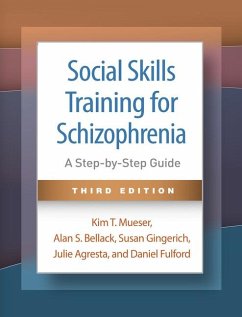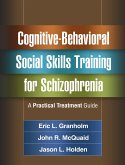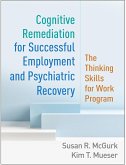Kim T. Mueser, Alan S. Bellack (and Clinical Center (MIRECC) United States ), Susan Gingerich
Social Skills Training for Schizophrenia
A Step-By-Step Guide
Kim T. Mueser, Alan S. Bellack (and Clinical Center (MIRECC) United States ), Susan Gingerich
Social Skills Training for Schizophrenia
A Step-By-Step Guide
- Broschiertes Buch
- Merkliste
- Auf die Merkliste
- Bewerten Bewerten
- Teilen
- Produkt teilen
- Produkterinnerung
- Produkterinnerung
The authoritative presentation of social skills training (SST)--a highly effective, recovery-oriented intervention for people with serious mental illness--the third edition of this complete manual has been significantly revised with over 60% new material.
Andere Kunden interessierten sich auch für
![Cognitive-Behavioral Social Skills Training for Schizophrenia Cognitive-Behavioral Social Skills Training for Schizophrenia]() Eric L GranholmCognitive-Behavioral Social Skills Training for Schizophrenia57,99 €
Eric L GranholmCognitive-Behavioral Social Skills Training for Schizophrenia57,99 €![The Complete Family Guide to Schizophrenia The Complete Family Guide to Schizophrenia]() Kim T. MueserThe Complete Family Guide to Schizophrenia31,99 €
Kim T. MueserThe Complete Family Guide to Schizophrenia31,99 €![Psychotherapy for Psychosis Psychotherapy for Psychosis]() Michael Garrett (United States SUNY Downstate Medical Center)Psychotherapy for Psychosis65,99 €
Michael Garrett (United States SUNY Downstate Medical Center)Psychotherapy for Psychosis65,99 €![Compliance with Treatment in Schizophrenia Compliance with Treatment in Schizophrenia]() Alec BuchananCompliance with Treatment in Schizophrenia26,99 €
Alec BuchananCompliance with Treatment in Schizophrenia26,99 €![Cognitive Remediation for Successful Employment and Psychiatric Recovery Cognitive Remediation for Successful Employment and Psychiatric Recovery]() Susan R. McGurkCognitive Remediation for Successful Employment and Psychiatric Recovery60,99 €
Susan R. McGurkCognitive Remediation for Successful Employment and Psychiatric Recovery60,99 €![Hidden Valley Road Hidden Valley Road]() Robert KolkerHidden Valley Road11,99 €
Robert KolkerHidden Valley Road11,99 €![Hidden Valley Road Hidden Valley Road]() Robert KolkerHidden Valley Road21,99 €
Robert KolkerHidden Valley Road21,99 €-
-
-
The authoritative presentation of social skills training (SST)--a highly effective, recovery-oriented intervention for people with serious mental illness--the third edition of this complete manual has been significantly revised with over 60% new material.
Hinweis: Dieser Artikel kann nur an eine deutsche Lieferadresse ausgeliefert werden.
Hinweis: Dieser Artikel kann nur an eine deutsche Lieferadresse ausgeliefert werden.
Produktdetails
- Produktdetails
- Verlag: Guilford Publications
- 3 ed
- Seitenzahl: 424
- Erscheinungstermin: 6. September 2024
- Englisch
- Abmessung: 267mm x 203mm x 21mm
- Gewicht: 916g
- ISBN-13: 9781462555031
- ISBN-10: 1462555039
- Artikelnr.: 70205905
- Herstellerkennzeichnung
- Libri GmbH
- Europaallee 1
- 36244 Bad Hersfeld
- gpsr@libri.de
- Verlag: Guilford Publications
- 3 ed
- Seitenzahl: 424
- Erscheinungstermin: 6. September 2024
- Englisch
- Abmessung: 267mm x 203mm x 21mm
- Gewicht: 916g
- ISBN-13: 9781462555031
- ISBN-10: 1462555039
- Artikelnr.: 70205905
- Herstellerkennzeichnung
- Libri GmbH
- Europaallee 1
- 36244 Bad Hersfeld
- gpsr@libri.de
Kim T. Mueser, PhD, is Professor in the Department of Occupational Therapy and the Department of Psychological and Brain Sciences at Boston University (BU), and Adjunct Professor of Psychiatry at the Geisel School of Medicine at Dartmouth. He is also affiliated with the BU Center for Psychiatric Rehabilitation, where he served as Executive Director from 2011 to 2016. Dr. Mueser has served as an editorial board member or editor of numerous peer-reviewed journals. He is a recipient of the Michael S. Neale Award from Division 18 (Psychologists in Public Service) of the American Psychological Association and the Armin Loeb Research Award from the Psychiatric Rehabilitation Association. He has coauthored over 400 peer-reviewed journal articles, 20 books, and 100 book chapters. Alan S. Bellack, PhD, ABPP, until his retirement in 2013, was Professor of Psychiatry and Director of the Division of Psychology at the University of Maryland School of Medicine and Director of the VA Capitol Health Care Network Mental Illness Research, Education, and Clinical Center (MIRECC). In recognition of his lifetime research on psychosocial aspects of schizophrenia, he received the Alexander Gralnick Research Investigator Award from the American Psychological Foundation, among other awards. Dr. Bellack is coauthor or coeditor of more than 190 journal articles, 30 books, and 46 book chapters in the areas of schizophrenia, depression, social skills training, and substance abuse. Susan Gingerich, MSW, is a social worker based in Philadelphia. Ms. Gingerich has worked with individuals with schizophrenia and their family members since the 1980s. She currently serves as Training Coordinator and a trainer for the NAVIGATE program for first-episode psychosis, which integrates social skills training with other treatment components. She received the Larry J. Seidman Award for Leadership from the Psychosis-Risk and Early Psychosis Program Network (PEPPNET). Ms. Gingerich is the coauthor of several books and multiple articles related to her research interests, which include social skills training, illness management and recovery, technology-based support for preventing relapses, family education and support, and training community mental health centers in evidence-based practices. Julie Agresta, MEd, LCSW, is a licensed clinical social worker in private practice in Blue Bell, Pennsylvania. Since the 1990s, she has provided consultation services to community-based programs and agencies serving adults and children with mental health disorders and developmental disabilities. Ms. Agresta also provides therapy to children, adolescents, and adults. She is President of the Pennsylvania Society for Clinical Social Work. Daniel Fulford, PhD, is a clinical psychologist and Associate Professor in the Department of Occupational Therapy and the Department of Psychological and Brain Sciences at Boston University. Dr. Fulford's clinical and research interests include motivational and social impairments in serious mental illness; he often uses ambulatory methods, including the development and testing of digital therapeutics, in his work. He has been named a Face of the Future by the Society for Research in Psychopathology and was co-recipient of a Visionary Grant from the American Psychological Foundation. Dr. Fulford has published his work in top journals and serves as Associate Editor for several journals, including the Journal of Psychopathology and Clinical Science.
Foreword, Patrick D. McGorry
I. Principles, Research, and Assessment
1. Schizophrenia, Social Skills, and Recovery
2. SST as an Evidence-Based Practice
3. Assessment
II. Teaching Social Skills
4. Methods for Teaching Social Skills
5. Starting an SST Group
6. Curricula for SST Groups
7. Tailoring Skills for Individual Needs and Goals
8. Solutions for Common Problems
III. Special Populations, Settings, and Needs
9. Co-Occurring Substance Use Disorders
10. Clinical High Risk and First Episode Psychosis
11. SST for Technology-Based Communication
12. Older Individuals
13. Inpatient and Residential Settings
14. Cultural Issues
15. Considerations for Gender and Sexual Identity and Social Skills Related
to Sexual Harassment
IV. Curricular Skill Sheets for Group Leaders
- Four Basic Social Skills
- Conversation Skills
- Assertiveness Skills
- Friendship and Dating
- Dealing with Conflict
- Dealing with Substance Use Situations
- Education Skills
- Work Skills
- Technology-Based Communication
- Living with Other People
- Interacting with Healthcare Professionals
- Solving Problems
References
Index
I. Principles, Research, and Assessment
1. Schizophrenia, Social Skills, and Recovery
2. SST as an Evidence-Based Practice
3. Assessment
II. Teaching Social Skills
4. Methods for Teaching Social Skills
5. Starting an SST Group
6. Curricula for SST Groups
7. Tailoring Skills for Individual Needs and Goals
8. Solutions for Common Problems
III. Special Populations, Settings, and Needs
9. Co-Occurring Substance Use Disorders
10. Clinical High Risk and First Episode Psychosis
11. SST for Technology-Based Communication
12. Older Individuals
13. Inpatient and Residential Settings
14. Cultural Issues
15. Considerations for Gender and Sexual Identity and Social Skills Related
to Sexual Harassment
IV. Curricular Skill Sheets for Group Leaders
- Four Basic Social Skills
- Conversation Skills
- Assertiveness Skills
- Friendship and Dating
- Dealing with Conflict
- Dealing with Substance Use Situations
- Education Skills
- Work Skills
- Technology-Based Communication
- Living with Other People
- Interacting with Healthcare Professionals
- Solving Problems
References
Index
Foreword, Patrick D. McGorry
I. Principles, Research, and Assessment
1. Schizophrenia, Social Skills, and Recovery
2. SST as an Evidence-Based Practice
3. Assessment
II. Teaching Social Skills
4. Methods for Teaching Social Skills
5. Starting an SST Group
6. Curricula for SST Groups
7. Tailoring Skills for Individual Needs and Goals
8. Solutions for Common Problems
III. Special Populations, Settings, and Needs
9. Co-Occurring Substance Use Disorders
10. Clinical High Risk and First Episode Psychosis
11. SST for Technology-Based Communication
12. Older Individuals
13. Inpatient and Residential Settings
14. Cultural Issues
15. Considerations for Gender and Sexual Identity and Social Skills Related
to Sexual Harassment
IV. Curricular Skill Sheets for Group Leaders
- Four Basic Social Skills
- Conversation Skills
- Assertiveness Skills
- Friendship and Dating
- Dealing with Conflict
- Dealing with Substance Use Situations
- Education Skills
- Work Skills
- Technology-Based Communication
- Living with Other People
- Interacting with Healthcare Professionals
- Solving Problems
References
Index
I. Principles, Research, and Assessment
1. Schizophrenia, Social Skills, and Recovery
2. SST as an Evidence-Based Practice
3. Assessment
II. Teaching Social Skills
4. Methods for Teaching Social Skills
5. Starting an SST Group
6. Curricula for SST Groups
7. Tailoring Skills for Individual Needs and Goals
8. Solutions for Common Problems
III. Special Populations, Settings, and Needs
9. Co-Occurring Substance Use Disorders
10. Clinical High Risk and First Episode Psychosis
11. SST for Technology-Based Communication
12. Older Individuals
13. Inpatient and Residential Settings
14. Cultural Issues
15. Considerations for Gender and Sexual Identity and Social Skills Related
to Sexual Harassment
IV. Curricular Skill Sheets for Group Leaders
- Four Basic Social Skills
- Conversation Skills
- Assertiveness Skills
- Friendship and Dating
- Dealing with Conflict
- Dealing with Substance Use Situations
- Education Skills
- Work Skills
- Technology-Based Communication
- Living with Other People
- Interacting with Healthcare Professionals
- Solving Problems
References
Index








